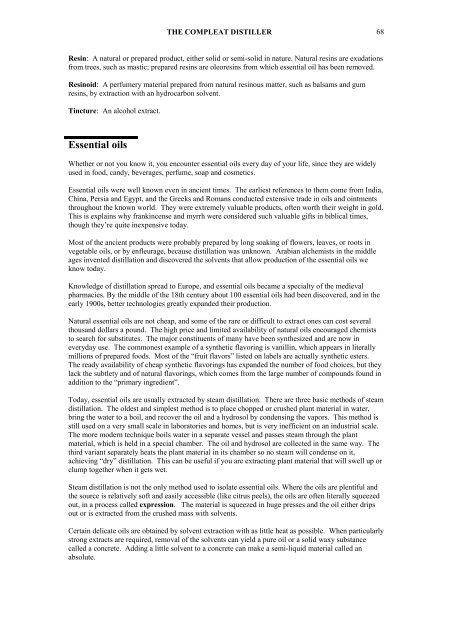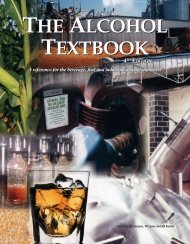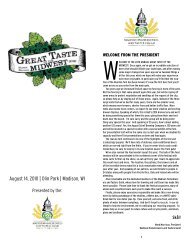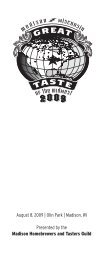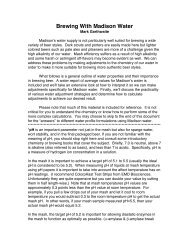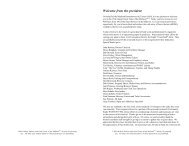The Compleat Distiller
The Compleat Distiller
The Compleat Distiller
Create successful ePaper yourself
Turn your PDF publications into a flip-book with our unique Google optimized e-Paper software.
THE COMPLEAT DISTILLER 68<br />
Resin: A natural or prepared product, either solid or semi-solid in nature. Natural resins are exudations<br />
from trees, such as mastic; prepared resins are oleoresins from which essential oil has been removed.<br />
Resinoid: A perfumery material prepared from natural resinous matter, such as balsams and gum<br />
resins, by extraction with an hydrocarbon solvent.<br />
Tincture: An alcohol extract.<br />
Essential oils<br />
Whether or not you know it, you encounter essential oils every day of your life, since they are widely<br />
used in food, candy, beverages, perfume, soap and cosmetics.<br />
Essential oils were well known even in ancient times. <strong>The</strong> earliest references to them come from India,<br />
China, Persia and Egypt, and the Greeks and Romans conducted extensive trade in oils and ointments<br />
throughout the known world. <strong>The</strong>y were extremely valuable products, often worth their weight in gold.<br />
This is explains why frankincense and myrrh were considered such valuable gifts in biblical times,<br />
though they’re quite inexpensive today.<br />
Most of the ancient products were probably prepared by long soaking of flowers, leaves, or roots in<br />
vegetable oils, or by enfleurage, because distillation was unknown. Arabian alchemists in the middle<br />
ages invented distillation and discovered the solvents that allow production of the essential oils we<br />
know today.<br />
Knowledge of distillation spread to Europe, and essential oils became a specialty of the medieval<br />
pharmacies. By the middle of the 18th century about 100 essential oils had been discovered, and in the<br />
early 1900s, better technologies greatly expanded their production.<br />
Natural essential oils are not cheap, and some of the rare or difficult to extract ones can cost several<br />
thousand dollars a pound. <strong>The</strong> high price and limited availability of natural oils encouraged chemists<br />
to search for substitutes. <strong>The</strong> major constituents of many have been synthesized and are now in<br />
everyday use. <strong>The</strong> commonest example of a synthetic flavoring is vanillin, which appears in literally<br />
millions of prepared foods. Most of the “fruit flavors” listed on labels are actually synthetic esters.<br />
<strong>The</strong> ready availability of cheap synthetic flavorings has expanded the number of food choices, but they<br />
lack the subtlety and of natural flavorings, which comes from the large number of compounds found in<br />
addition to the “primary ingredient”.<br />
Today, essential oils are usually extracted by steam distillation. <strong>The</strong>re are three basic methods of steam<br />
distillation. <strong>The</strong> oldest and simplest method is to place chopped or crushed plant material in water,<br />
bring the water to a boil, and recover the oil and a hydrosol by condensing the vapors. This method is<br />
still used on a very small scale in laboratories and homes, but is very inefficient on an industrial scale.<br />
<strong>The</strong> more modern technique boils water in a separate vessel and passes steam through the plant<br />
material, which is held in a special chamber. <strong>The</strong> oil and hydrosol are collected in the same way. <strong>The</strong><br />
third variant separately heats the plant material in its chamber so no steam will condense on it,<br />
achieving “dry” distillation. This can be useful if you are extracting plant material that will swell up or<br />
clump together when it gets wet.<br />
Steam distillation is not the only method used to isolate essential oils. Where the oils are plentiful and<br />
the source is relatively soft and easily accessible (like citrus peels), the oils are often literally squeezed<br />
out, in a process called expression. <strong>The</strong> material is squeezed in huge presses and the oil either drips<br />
out or is extracted from the crushed mass with solvents.<br />
Certain delicate oils are obtained by solvent extraction with as little heat as possible. When particularly<br />
strong extracts are required, removal of the solvents can yield a pure oil or a solid waxy substance<br />
called a concrete. Adding a little solvent to a concrete can make a semi-liquid material called an<br />
absolute.


